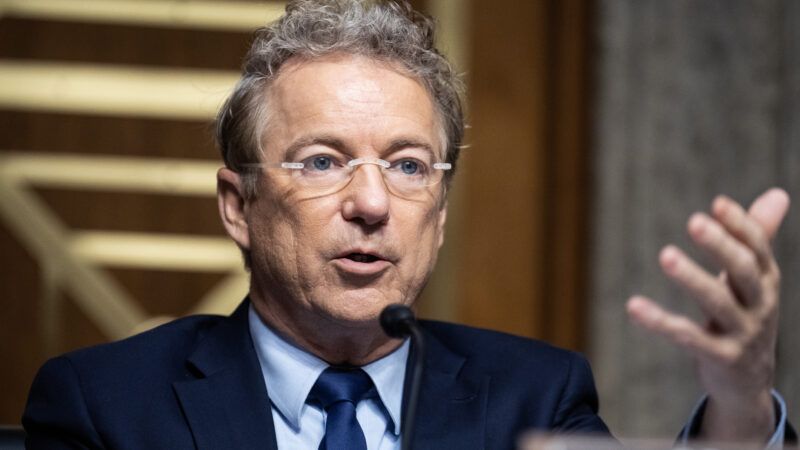Rand Paul Is Leading Another Long-Shot Effort at Stopping Trump's Terrible Trade War
Bills introduced Tuesday in the House and Senate would terminate the emergency declaration Trump issued last week.

Lawmakers from both parties and both houses of Congress have launched a long-shot effort at stopping President Donald Trump's global trade war amid the falling stock market and rising fears of a recession.
Bills introduced Tuesday in the House and Senate would terminate the emergency declaration that Trump signed last week and used to impose tariffs on nearly all goods imported into the United States.
"Tariffs are taxes, and the power to tax belongs to Congress—not the president," Sen. Rand Paul (R–Ky.) said in a statement. "Abusing emergency powers to impose blanket tariffs not only drives up costs for American families but also tramples on the Constitution."
Paul and Sen. Ron Wyden (D–Ore.) are the lead sponsors of the Senate resolution, which has also picked up support from Senate Minority Leader Chuck Schumer (D–N.Y.) and Sens. Tim Kaine (D–Va.), Jeanne Shaheen (D–N.H.), Elizabeth Warren (D–Mass.) and Peter Welch (D–Vt.).
Over in the House, a similar resolution was introduced Tuesday and is backed by dozens of Democrats, including the ranking members of the House Foreign Affairs Committee and the House Ways and Means Committee.
"Trump is dragging our country into a trade war against our allies and imposing the largest tax increase on the American people in our history," said Rep. Suzan DelBene (D–Wash.), who has led other efforts in the House to rein in executive authority over tariffs.
Trump used the International Emergency Economic Powers Act (IEEPA) to impose a 10 percent tariff on all imports last week. Higher country-specific tariffs—some in excess of 40 percent—are scheduled to be enacted on Wednesday. That law allows Congress to cancel a presidential emergency declaration, though lawmakers have never done so without the sitting president going along.
Trump also used the IEEPA as the legal basis for the 25 percent tariffs on nearly all imports from Mexico and Canada, which he announced in February. Prior to that, the law had never been used to impose tariffs, which has raised some questions about whether Trump is overstepping the letter of the law. He's clearly well outside the spirit of the law, as it is ridiculous to claim that all imports to the U.S. somehow constitute an emergency that demands unilateral executive action.
Last week, the Senate voted to cancel Trump's tariffs on Canada. Paul was one of four Republicans to support that measure, which has not yet received a vote in the House. Separately, the Senate is also considering a bill that would cancel any new tariffs after 60 days unless Congress affirmatively voted to continue them. The White House has threatened to veto that bill (and Trump would likely veto any attempt at curbing the IEEPA as well). To overcome a presidential veto, these antitariff bills would need support from at least 77 Republicans in the House and at least 20 Republicans in the Senate.
As a practical matter, these efforts can not succeed unless more Republicans get on board. They should. Trump's reckless trade war is a dangerous expansion of executive power and a stark example of how central planning results in economic catastrophe.
Plenty of Republicans know that combination is bad news for the country. The question is whether they can overcome their fear of Trump long enough to do something about it.


Show Comments (49)